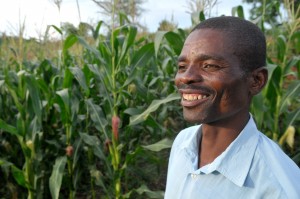
Could conservation agriculture help mitigate climate change?
 In the densely populated areas of South Asia on the Indo-Gangetic plains (IGP) and Sub-Saharan Africa (SSA), climate change threatens to pose an enormous risk to food security. By the year 2050 both regions are expected to suffer crop yield decreases of at least 20%, with a 40% chance of crop failure for maize in a given season in much of Southern Africa, making a sustainable increase of food production critical in the near future.
In the densely populated areas of South Asia on the Indo-Gangetic plains (IGP) and Sub-Saharan Africa (SSA), climate change threatens to pose an enormous risk to food security. By the year 2050 both regions are expected to suffer crop yield decreases of at least 20%, with a 40% chance of crop failure for maize in a given season in much of Southern Africa, making a sustainable increase of food production critical in the near future.
It has been shown that adopting conservation agriculture (CA) practices has the potential to increase crop yields, reduce soil degradation and make agricultural systems more resilient to weather-induced stresses such as climate change. In addition, some have claimed that CA has the potential to mitigate climate change by sequestering organic carbon in soil. A recent study funded by the CGIAR Research Center on Climate Change, Agriculture and Food Security (CCAFS) seeks to determine if this claim is true, and to what extent, by examining and comparing measured changes in soil organic carbon (SOC) stock under different CA practices and other mitigation measures such as improved management of nitrogen fertilizers. The study focused on the Indo-Gangetic plains and Sub-Saharan Africa because of these regions critical importance to global food security.
The study found that all CA practices cause some increase in SOC stock, which would imply some degree of climate change mitigation. However, the study points out that some of the results may be inflated due to inappropriate soil sampling measures. The authors of the study emphasize the importance of assessing which specific management practice is responsible for any significant increase in SOC stock, in order to determine whether it is genuine climate change mitigation or a redistribution of organic carbon already present in soil. Of all the principles of CA, crop diversification was found to have the greatest climate change mitigation potential from carbon sequestration in soil, which merits further investigation.
The study concludes that in most cases CA practices show only a small degree of climate change mitigation through soil carbon sequestration, and that the improved management of nitrogen fertilizer is a more effective and sustainable means of mitigating climate change. However, regardless of mitigation benefits, the adoption of CA practices has the potential improve soil quality, thus increasing farmer’s resilience to climate change.
To read the abstract of the study, please click here:
Powlson D, Stirling C, Thierfelder C, White R, Jat ML. 2015. Does conservation agriculture deliver climate change mitigation through soil carbon sequestration in tropical agro-ecosystems? Agriculture, Ecosystems and Environment 220:164-174.
Africa, Asia, CCAFS, climate change, conservation agriculture, Sub-Saharan Africa
